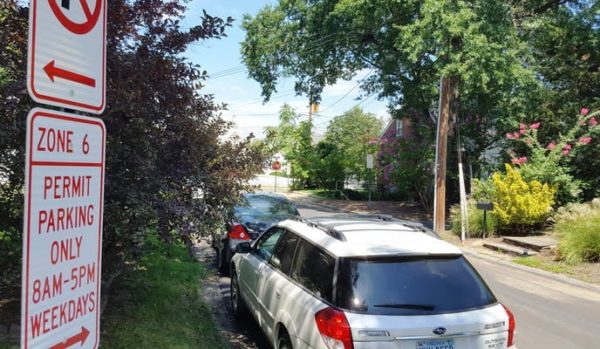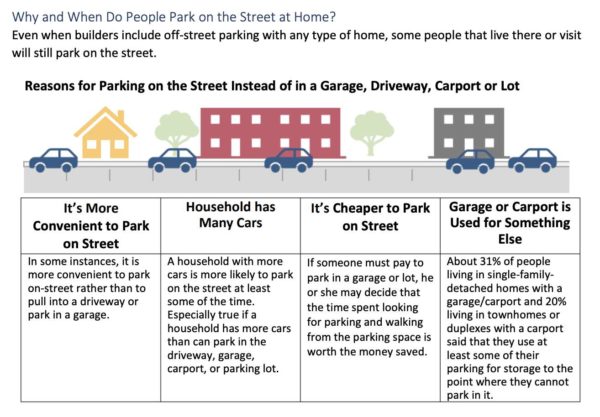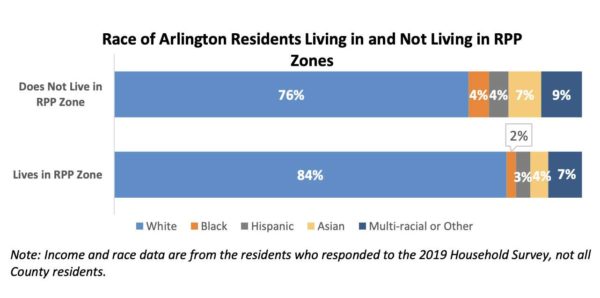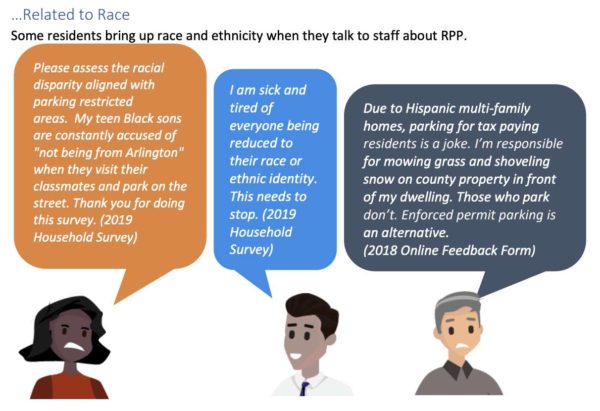(Updated at 11:40 a.m.) Arlington County staff are recommending adding a pay-to-park option in residential zones for short-term visitors, while expanding who can petition for Residential Permit Parking restrictions.
These are two of the changes to the program staff are proposing that the County Board adopt. The changes will be reviewed and refined before the Board votes early next year, and come three years after a moratorium was placed on new parking restrictions so a review of the program could be conducted.
“We are attempting to make compromises between disparate viewpoints and disagreements about how the program should be structured,” said Stephen Crim, the RPP review program manager, who fielded questions from residents during a virtual Q&A session last week.
Residential areas with RPP restrictions would have paid, two-hour parking so that short-term visitors can legally park without a pass or permit. Payments will be processed through the ParkMobile app or through the EasyPark device, instead of pay stations.
The benefit of paid parking over free, time-limited parking in residential zones — as is in place in parts of D.C. — is that “we make the parking easier to enforce for the police and make it more likely to be enforced regularly,” Crim said.
Permit and pass fees would be raised to pay for 100% of the program’s costs, whereas 40% of the costs to administer and enforce the RPP program currently come from general tax funding. Discounts on permits and passes would be available to low-income households .
Staff recommend granting more parking options and permits to employees of K-12 schools and group homes, as well as reducing the number of permits that households can receive based on whether they have off-street parking such as driveways or garages.
Staff propose to remove the “out-of-area” test from the permit process, which requires would-be RPP zones to have a preponderance of commuters, shoppers or other people from outside the neighborhood taking up street parking spaces. Crim said that change is a way of “shifting the program into a more general parking management program.”
Currently, the county needs to see that a block has 75% of spaces are occupied, of which at least 25% are occupied by out-of-area vehicles.
The RPP program has sharply divided residents. According to a recently released report, some of these divisions occur along the lines of race and class, as permitted residential street parking is disproportionately available to white, affluent Arlingtonians.
Residents of most apartment buildings are currently not eligible to receive RPP permits. More will be eligible under the proposed changes, but many will still be shut out if their building was approved by the County Board via a site plan or certain types of use permits.
Residents can see if their address currently qualifies for a permit through this link.
Apartment residents in the Arlington Mill neighborhood contended that affluence was an issue because restrictions put in place in the adjacent Forest Glen neighborhood made it difficult to park for those who do not work traditional 9-5 jobs. In a contentious decision last year in response, the County Board repealed some restrictions.
County staff are recommending excluding most types of new development in the RPP program, Crim said, noting that the county wants to ensure developers provide parking to residents rather than offload parking to the street.
Excluding most new developments from RPP would mitigate quarrels between developers, new residents and long-time neighbors as the county continues to address its affordable housing crisis, he said.
“Our survey work confirmed that support for new housing drops quite a bit if the people who are going to live in those buildings will be able to park on the existing residents’ streets,” Crim said. “So in essence, this is a policy that is meant to allow for the housing development that the community would benefit from.”
The county is accepting public comments on the proposed changes through Wednesday.
“By no means is the program totally finalized but we are in final phase of public engagement,” a county spokesman said during the virtual Q&A.
After the comment period ends, people can still participate in the following meetings, prior to an expected County Board vote in early 2021:
- The November 2020 meetings of the Tenant-Landlord Commission, Transportation Commission and Planning Commission
- The December 2020 County Board meeting
- The January 2021 Transportation and Planning Commission meetings
Photo courtesy Arlington County





